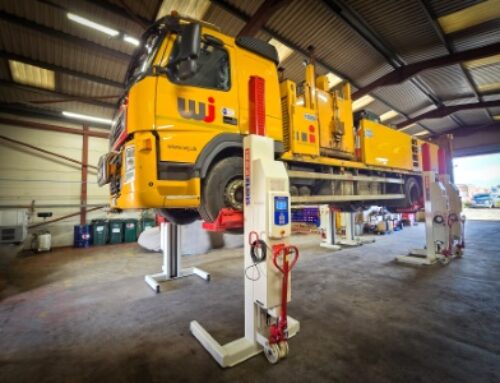IRTE releases updated wheel security guide
 IRTE, part of the Society of Operations Engineers, has announced the release of an updated guide to wheel security, in a bid to help establish best practice for wheel maintenance.
IRTE, part of the Society of Operations Engineers, has announced the release of an updated guide to wheel security, in a bid to help establish best practice for wheel maintenance.
Despite its potentially harmful and sometimes destructive outcome, wheel loss on commercial vehicles is an ongoing problem, points out the organisation – with incidents in which wheels have come loose from vehicles, or come off altogether and caused an accident, having sparked much discussion about the causes of the problem, and what can be done to prevent it.
According to John Eastman, IRTE Council chairman, there are so many potential hazards when fitting a wheel that technicians can easily become unsure of what exactly is considered best practice; quite often it is a matter of compatibility, and with so many types of wheels now on the market, new and used, technicians are more wary of the damage that can be done if the wrong fittings are used.
IRTE says its updated wheel security guide aims to give those operators guidance, and the tyre technicians fitting the wheels comprehensive instruction to better prepare them for this critical role.
John said: “The biggest problem is when people don’t follow the process. What you cannot do is fit any wheel to any vehicle, or the hub, because there are so many different types of fitting out there. If you put the wrong fittings on with the wrong wheel, or the wrong fittings or nuts, then you’re inviting trouble.”
Further difficulties can arise, says John, when the conditions in a workshop are not kept to a high standard. Not keeping a workshop clean can lead to unnecessary complications when it comes to the tightening of the wheel, which can then become loose over time.
“If you do not prepare the surfaces on the wheels, on twin wheels properly then what you’re putting between the two surfaces is often dirt and grit,” he added.
“If you then tighten the wheels up, they are going to compress the dirt and the grit. Eventually that works loose, so you have now got loose wheels. They will start to move about on the vibration and make the wheel nuts come loose. The stud starts to be eaten away and the wheels are moving.”
Overtightening wheel studs is a common cause for loosening wheels, points out IRTE, especially when technicians are using high pressure air impact guns instead of manual tools.
As a large proportion of wheel and tyre-related accidents are the result of human error, operators can now accredit their technicians to the tyretec standard, in addition to industry standard for vehicle technicians irtec and IRTE Workshop Accreditation, for premises.
“The accreditation means that they’re trained in best practice,” John continued.
“Some places still run them up with a wheel gun, but that is not the right way to do it. You have got to do it properly with a calibrated torque wrench. In most cases, technicians are capable and trained to a high level. If they are irtec licenced, if they have achieved the tyretec accreditation, or if they are working for a good, reputable operator then, yes, they should be.
“But the problem is, wheels are still falling off vehicles, so that means that there are still people out there who are not aware of the best practice.”
Operators rely on drivers carrying out pre-use checks on their vehicles and, although there are several tools on the market that can help that process, some still don’t carry out the checks as they should, says John.
“One incident is too many. Any wheel that comes loose off a vehicle is a potential killer. Not only to the driver of the vehicle, but other car users and pedestrians. Wheels can come off at high speed if they have not been put on or secured properly.”
On the new guide, John added: “It’s just been updated, and it covers all awareness issues that technicians need to be trained on. Managers should be instructing their tyre technicians to follow the process and make it part of their understanding. A lot of companies now have their own policy which revolves around the guide.”











